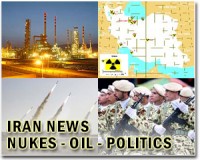 |
Geneva (AFP) Dec 7, 2010 Six world powers and Iran wrapped up two days of talks in Geneva Tuesday on Tehran's contentious nuclear programme, with an agreement to meet again in Istanbul next month despite clear differences. The European Union's top diplomat Catherine Ashton told journalists they agreed to fresh talks in Istanbul to "discuss practical ideas and ways of cooperating towards the resolution of our core concerns about the nuclear issue." But Iran's top negotiator Saeed Jalili said barely an hour later that both sides agreed only to further "talks based on cooperation" in Istanbul at the end of January and that everything else was "not true." "The only outcome of our talks today was the agreement we reached to organise a set of talks based on cooperation... and anything other than this has no value," said Jalili, adding that additional points were a sign of "disrespect." Jalili insisted that parties to the Geneva talks agreed on the final wording, and that he "didn't think parties would say differently from what happened." "If this happened, then that would only create a high wall of mistrust. "It only took us a few minutes to come to the hotel from the conference centre, it would be regretful if within a few minutes, the wording has been changed." Jalili said that the next meeting would take place only "exclusively on the basis" of the wording agreed in the Geneva talks. "We hope they will respect the conclusion of the meeting. As long as they respect it, the meeting will take place," he said. The Swiss organiser of talks had originally announced that Jalili would hold a joint press conference with Ashton, but finally only the Iranian was present. The Iranian nuclear negotiator would not be drawn into why Ashton cancelled. In a separate meeting with the press, Ashton did not take questions, but only read out a statement, saying that world powers "recognise Iran's rights, but insist it fulfils its obligations." The EU's top diplomat represented the five permanent powers of the Security Council -- Britain, China, France, Russia and the United States, plus Germany at the Geneva meeting. Besides holding plenaries with all parties, Jalili also met one-on-one with heads of several delegations, including Britain, China and Russia. In addition, he held a working dinner with Ashton on Monday night. However, Jalili had refused a request by the head of the US delegation, Under Secretary of State William Burns, for a bilateral meeting, a source close to the Geneva talks said. A senior US administration official said following the two-day negotiations: "All expectations for these talks were low and I can't say they were exceeded." But he insisted that they were a start and that they had dealt three quarters of the time with the nuclear issue even though the discussions were "difficult, candid." He underlined that suspension of enrichment "is still mandated by UN Security Council resolutions and that is still the position of the P5+1 (powers)." In Istanbul, the six powers would be seeking "concrete steps that can be used to rebuild confidence," the official said. Iranian President Mahmoud Ahmadinejad meanwhile called on the six -- Britain, China, France, Germany, Russia and the United States -- to lift international sanctions against his country if they want the talks "to be fruitful." Iran is under four sets of UN sanctions over its refusal to suspend uranium enrichment, the sensitive process which can be used to make nuclear fuel or, in highly extended form, the fissile core of an atom bomb. Iran rejects claims by the West and Israel that its uranium enrichment programme masks a covert bid to acquire nuclear weapons, maintaining that it is developing nuclear energy solely for peaceful purposes. Western sources had described the first day of talks as "good, constructive, and in a good atmosphere." Iran triggered heightened concern in the West on Sunday by revealing it had taken a new step in the nuclear fuel cycle, producing its first home-grown batch of the raw material for enrichment, uranium yellowcake and making it "self sufficient," according to the country's atomic chief.
Share This Article With Planet Earth
Related Links Learn about nuclear weapons doctrine and defense at SpaceWar.com Learn about missile defense at SpaceWar.com All about missiles at SpaceWar.com Learn about the Superpowers of the 21st Century at SpaceWar.com
 Iran claims upper ground in nuclear talks with world powers
Iran claims upper ground in nuclear talks with world powersGeneva (AFP) Dec 6, 2010 Iran and world powers will hold talks on their deepening standoff over the Iranian nuclear programme for the first time in 14 months on Monday with Tehran claiming it has strengthened its hand. Iran raised the stakes on Sunday when it revealed that it had mined and produced its first home-grown batch of uranium yellowcake - the raw material for enrichment - instead of seeking to import new ... read more |
|
| The content herein, unless otherwise known to be public domain, are Copyright 1995-2010 - SpaceDaily. AFP and UPI Wire Stories are copyright Agence France-Presse and United Press International. ESA Portal Reports are copyright European Space Agency. All NASA sourced material is public domain. Additional copyrights may apply in whole or part to other bona fide parties. Advertising does not imply endorsement,agreement or approval of any opinions, statements or information provided by SpaceDaily on any Web page published or hosted by SpaceDaily. Privacy Statement |